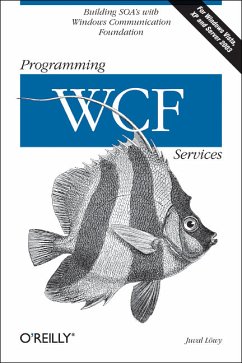Written by Microsoft software legend Juval Lowy, Programming WCF Services is the authoritative introduction to Microsoft's new, and some say revolutionary, unified platform for developing service-oriented applications (SOA) on Windows. Relentlessly practical, the book delivers insight, not documentation, to teach developers what they need to know to build the next generation of SOAs.
After explaining the advantages of service-orientation for application design and teaching the basics of how to develop SOAs using WCF, the book shows how you can take advantage of built-in features such as service hosting, instance management, asynchronous calls, synchronization, reliability, transaction management, disconnected queued calls and security to build best in class applications. Programming WCF Services focuses on the rationale behind particular design decisions, often shedding light on poorly-documented and little-understood aspects of SOA development. Developers and architects will learn not only the "how" of WCF programming, but also relevant design guidelines, best practices, and pitfalls. Original techniques and utilities provided by the author throughout the book go well beyond anything that can be found in conventional sources.
Based on experience and insight gained while taking part in the strategic design of WCF and working with the team that implemented it, Programming WCF Services provides experienced working professionals with the definitive work on WCF. Not only will this book make you a WCF expert, it will make you a better software engineer. It's the Rosetta Stone of WCF.
Table of contents:
Foreword
Preface
1. WCF Essentials
What Is WCF?
Services
Addresses
Contracts
Hosting
Bindings
Endpoints
Metadata Exchange
Client-Side Programming
Programmatic Versus Administrative Configuration
WCF Architecture
Working with Channels
Reliability
2. Service Contracts
Operation Overloading
Contract Inheritance
Service Contracts Factoring and Design
Contract Queries
3. Data Contracts
Serialization
Data Contract Attributes
Data Contract Hierarchy
Data Contract Equivalence
Versioning
Enumerations
Delegates and Data Contracts
Data Sets and Tables
Generics
Collections
4. Instance Management
Behaviors
Per-Call Services
Per-Session Services
Singleton Service
Demarcating Operations
Instance Deactivation
Throttling
5. Operations
Request-Reply Operations
One-Way Operations
Callback Operations
Events
Streaming
6. Faults
Errors and Exceptions
Fault Contracts
Error-Handling Extensions
7. Transactions
The Recovery Challenge
Transactions
Transaction Propagation
Transaction Protocols and Managers
The Transaction Class
Transactional Service Programming
Explicit Transaction Programming
Service State Management
Instance Management and Transactions
Callbacks
8. Concurrency Management
Instance Management and Concurrency
Service Concurrency Mode
Instances and Concurrent Access
Resources and Services
Resource Synchronization Context
Service Synchronization Context
Custom Service Synchronization Context
Callbacks and Client Safety
Callbacks and Synchronization Context
Asynchronous Calls
9. Queued Services
Disconnected Services and Clients
Queued Calls
Transactions
Instance Management
Concurrency Management
Delivery Failures
Playback Failures
Queued Versus Connected Calls
Response Service
HTTP Bridge
10. Security
Authentication
Authorization
Transfer Security
Identity Management
Overall Policy
Scenario-Driven Approach
Intranet Application
Internet Application
Business-to-Business Application
Anonymous Application
No Security
Scenarios Summary
Declarative Security Framework
Security Auditing
A. Introduction to Service-Orientation
B. Publish-Subscribe Service
C. WCF Coding Standard
Index
After explaining the advantages of service-orientation for application design and teaching the basics of how to develop SOAs using WCF, the book shows how you can take advantage of built-in features such as service hosting, instance management, asynchronous calls, synchronization, reliability, transaction management, disconnected queued calls and security to build best in class applications. Programming WCF Services focuses on the rationale behind particular design decisions, often shedding light on poorly-documented and little-understood aspects of SOA development. Developers and architects will learn not only the "how" of WCF programming, but also relevant design guidelines, best practices, and pitfalls. Original techniques and utilities provided by the author throughout the book go well beyond anything that can be found in conventional sources.
Based on experience and insight gained while taking part in the strategic design of WCF and working with the team that implemented it, Programming WCF Services provides experienced working professionals with the definitive work on WCF. Not only will this book make you a WCF expert, it will make you a better software engineer. It's the Rosetta Stone of WCF.
Table of contents:
Foreword
Preface
1. WCF Essentials
What Is WCF?
Services
Addresses
Contracts
Hosting
Bindings
Endpoints
Metadata Exchange
Client-Side Programming
Programmatic Versus Administrative Configuration
WCF Architecture
Working with Channels
Reliability
2. Service Contracts
Operation Overloading
Contract Inheritance
Service Contracts Factoring and Design
Contract Queries
3. Data Contracts
Serialization
Data Contract Attributes
Data Contract Hierarchy
Data Contract Equivalence
Versioning
Enumerations
Delegates and Data Contracts
Data Sets and Tables
Generics
Collections
4. Instance Management
Behaviors
Per-Call Services
Per-Session Services
Singleton Service
Demarcating Operations
Instance Deactivation
Throttling
5. Operations
Request-Reply Operations
One-Way Operations
Callback Operations
Events
Streaming
6. Faults
Errors and Exceptions
Fault Contracts
Error-Handling Extensions
7. Transactions
The Recovery Challenge
Transactions
Transaction Propagation
Transaction Protocols and Managers
The Transaction Class
Transactional Service Programming
Explicit Transaction Programming
Service State Management
Instance Management and Transactions
Callbacks
8. Concurrency Management
Instance Management and Concurrency
Service Concurrency Mode
Instances and Concurrent Access
Resources and Services
Resource Synchronization Context
Service Synchronization Context
Custom Service Synchronization Context
Callbacks and Client Safety
Callbacks and Synchronization Context
Asynchronous Calls
9. Queued Services
Disconnected Services and Clients
Queued Calls
Transactions
Instance Management
Concurrency Management
Delivery Failures
Playback Failures
Queued Versus Connected Calls
Response Service
HTTP Bridge
10. Security
Authentication
Authorization
Transfer Security
Identity Management
Overall Policy
Scenario-Driven Approach
Intranet Application
Internet Application
Business-to-Business Application
Anonymous Application
No Security
Scenarios Summary
Declarative Security Framework
Security Auditing
A. Introduction to Service-Orientation
B. Publish-Subscribe Service
C. WCF Coding Standard
Index

